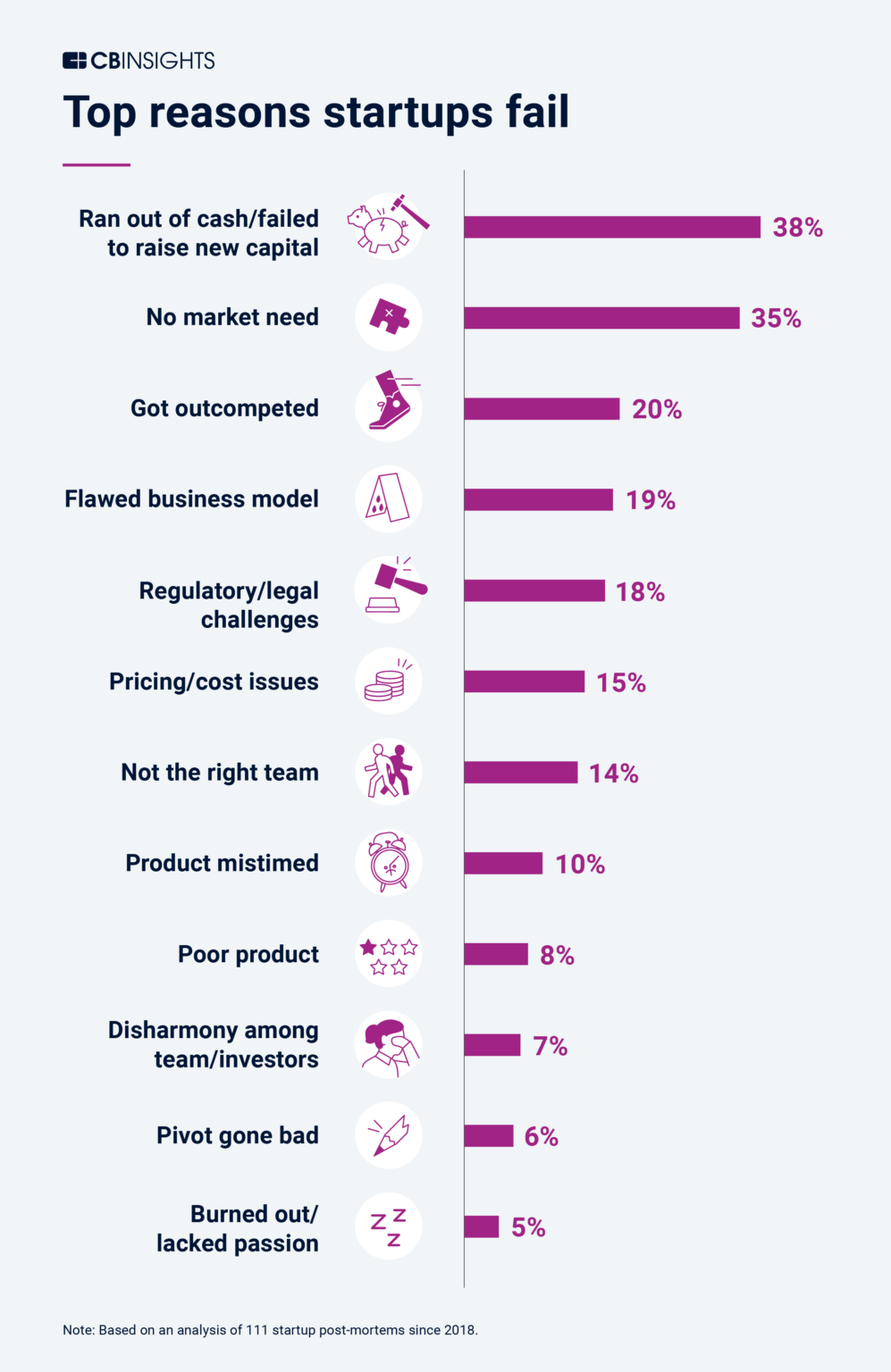Are CRM tools absolutely essential for startups today? It seems like the answer is supposed to be yes (especially since we sell CRM software).
But what if it’s not?
What if it’s possible to build a thriving business without relying on a CRM system? Let’s take a look at an unexpected source for the answer.
What dead businesses tell us about the value of CRM systems
CB Insights analyzed 111 post-mortems since 2018. These are startups that achieved traction initially, then crashed and burned.
They noticed some patterns.
Several causes appeared more frequently than others. All in all, they identified a dozen of the most common reasons for startup failure.

Kind of depressing, right?
But there are some valuable nuggets here, details that tell us a lot about whether a CRM system would have impacted.
#01. Ran out of cash
Sales mean revenue; consistent sales means your business can survive as long as (a.) your sales team brings in revenue and (b.) your margins ensure profit is left over.
A CRM system allows you to monitor this process closely. Using your CRM, you’re able to identify:
- Underperforming reps
- All-star reps
- Where sales reps can improve
- Top performing products
- Worst performing products
- Repeat products and services
- Products or services that lead to upsells
- The markers of a bad customer
Why do these details matter?
They matter because all of these factors significantly impact the amount of revenue your sales team can bring in.
Optimizing these issues means your sales team is generating revenue consistently. This makes running out of cash far less likely.
#02. No market need
According to CB Insights, “tackling problems that are interesting to solve rather than those that serve a market need was cited as the No. 2 reason for failure, noted in 35% of cases.”
These companies created a product or service no one wants.
How would a CRM system address this problem?
It’s simple.
With exit interviews! When a deal is lost, prospects should receive a simple one-question survey (multiple choice). At the end of the survey, ask prospects another question “If we have any questions, is it okay if we get in touch?”
Why does this work?
Your prospects and customers will tell you why they refused to buy (especially if they know it’s safe to do so). When your sales team requests this information from each individual customer, you’ll quickly gain the information you need.
You’ll discover that quickly if your product or service is something they don’t want.
#03. Outcompeted
The exit survey provides essential intel here. If you’re consistently losing deals to a competitor, the exit interview tells you who you’re losing to and why.
As your sales team collects more data, you gain a clearer picture of the competitive landscape and the details you’ll need to address to remain competitive.
#04. Flawed business model
Do customers prefer to pay monthly? Are people getting stuck on your refund or exchange policy? What sort of issues creates unnecessary friction in the sales process?
A CRM allows your team to document these issues as they appear in the sales process. These are typically in the form of:
- Questions
- Objections
- Fears
- Frustrations
- Poor past experiences
- Requests
- Misusing products, policies, or people
Showing your team what to look for, incentivizing them to collect good data, and implementing changes based on that data means you’ll be able to identify flaws in your business model.
Here’s the best part.
Consistent documentation means you’ll have a ready-made report you can export, package and present to executives in your company. This data will be especially compelling because it’s based on real-life customer data.
#05. Pricing/cost issues
Some of your customers may complain if your pricing is too expensive, but most won’t. They’ll simply take their business elsewhere.
Ongoing documentation from your sales team is essential to address this problem.
You can identify price and cost issues at various steps in the sales process.
- When customers or prospects request a quote, your sales reps can ask for a price range to determine if your organization is within a reasonable price range.
- After prospects have reviewed your proposal, you can request objections and discuss any pricing issues customers may have at that time.
- After a deal is lost, you can get pricing feedback from prospects, along with their expectations for what’s reasonable and their reasoning for doing so.
- After a deal is won, you can ask customers about your pricing and request their feedback on the costs involved. This will give you additional data enabling you to identify whether under/overcharging is a cause for concern.
Pricing is a concern that will kill more deals. While salespeople are trained and expected to believe they can overcome any pricing objection, the reality is far different.
As CB Insights’ post-mortems show, pricing plays a dominant role in your organization’s growth (or failure). Pricing is a factor that destroyed hundreds of companies in their study.
#06. Not the right team/disharmony among the team
Price’s law is a more precise variant of the 80/20 rule. It states that 50 percent of the work done in your company is done by the square root of the total number of people in your company.
What does this mean?
If your sales team consists of 25 employees, five do half of the work.
Your CRM system breaks down performance. You should have access to reports that identify your best and worst-performing salespeople.
For example:
- Individual win/loss ratios
- Individual conversion rates
- Revenue per salesperson
- Profit per salesperson
- Productivity
- Time to close
This performance data should help you to identify your A-players, A-player potentials, B, and C-players. Doing this is essential as it allows you to maintain team cohesiveness.
A-players attract more A-players, B-players attract B-players, and so on. This data is an essential part of maintaining the health of your team.
How so?
- Do you split incentives based on performance? If so, are any salespeople dragging the whole team down?
- Are some of your sales reps struggling to meet quota? Are there legitimate reasons for this happening?
- Which of your sales reps are unproductive? Which ones are uber productive?
- Which activities lead to sales and improve an individual rep’s conversion rates?
You should be able to create a clear snapshot of all of this whenever you need it. Using your CRM system, you should be able to gauge the performance of your sales team at the individual, group, team, and department levels.
This allows you to minimize friction and maintain team morale and performance.
#07. Poor product
Let’s say your prospects think your product is trash.
Are your prospects more or less likely to tell the executives, directors, and managers in your organization? What about your salespeople? They’re far more likely to announce this to your salespeople. In fact, many prospects would have no problem volunteering this information.
That’s the way it is.
But why, though? Is there something special about all of these leaders? What do they have that salespeople don’t have?
Respect.
According to Gallup’s Honesty/Ethics in Professions, salespeople are viewed with a tremendous amount of skepticism. In short, salespeople are viewed as dishonest. There’s a distinct lack of respect for salespeople.
In fact, only one profession was viewed as less trustworthy.
Lobbyists.
Well, that’s hurtful.
It’s terrible, but it’s also the reality of the situation. We all know why. A small group of dishonest salespeople ruins the public’s perception of salespeople.
Use it.
Get your prospects and customers to give your salespeople a piece of their mind. If they’re viewed as less-than in your market, get your buyers to sound off on the issues that frustrate them.
Document it. Then, use that data to increase revenue.
What about established businesses? How do you know your team needs a CRM system?
Look for the bottlenecks.
- Can your team (managers and salespeople) remember each prospect in your pipeline?
- Can you manually manage the various people involved in the deal (e.g., decision-maker, stakeholders, influencers, technical leads, etc.)?
- Can you manage your sales team manually via tools like Excel or Google Sheets?
- Can you manually manage all of the elements of your sales pipeline (individual salespeople, the sales team as a whole, the prospects assigned to each salesperson, sales reporting, etc.)?
A CRM system is necessary if the above questions are relevant to your business and you answered No to any of them.
You may not need a CRM system if you’re running a one-man operation, you have a small number of customers, receive a tiny number of leads, or you don’t do repeat business with customers.
Can your startup survive without a CRM?
Are CRM tools absolutely essential for startups today? They are.
Is it possible to build a thriving business without relying on a CRM system? Yes, but the consequences aren’t worth it. The companies in CB Insights’ research went out of business; the issues behind their failure stemmed from a lack of knowledge.
A CRM system would have allowed these companies to collect, catalog, and use the information they needed to survive.
It’s too late for these companies.
It’s not too late for you. With a simple approach, your CRM system can provide you with the tools, structure, and know-how you need to increase revenue and profit, no spreadsheets necessary.




